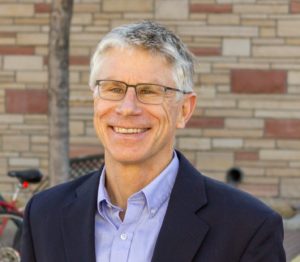Our Team | Kenneth Reardon

Kenneth Reardon
Professor and Jud and Pat Harper Chair of Chemical and Biological Engineering
Director of Education and Outreach
Areas of expertise: Systems biology (primarily proteomics), and applied microbiology/microbial ecology. His group’s current projects involve biosensors, the application of proteomics to microbiome analysis
Dr. Kenneth Reardon is Professor and Jud and Pat Harper Chair of Chemical and Biological Engineering and holds joint appointments in several other science and engineering programs at CSU, including Cell and Molecular Biology, Ecology, and Biomedical Engineering. Dr. Reardon received his BS degree from the University of Pennsylvania and his PhD from the California Institute of Technology, both in chemical engineering. His research combines bioreactor analysis, systems biology (primarily proteomics), and applied microbiology and microbial ecology. His group’s current projects involve biosensors, the application of proteomics to microbiome analysis, and the analysis and engineering of bacteria and algae for the production of biofuels and other chemicals. He is also interested in the interconnected challenges of food, energy, and water production (the food-energy-water nexus), which is becoming a major issue around the world. Dr. Reardon is the Director of the Sustainable Bioenergy Development Center and a co-Director of the Colorado Center for Biorefining and Biofuels. He is also the founder and Chief Technology Officer of OptiEnz Sensors, which is based on research from his laboratory. Dr. Reardon received the Faculty Excellence Award from the College of Engineering at CSU in 2009.
Potential projects to apply to:
The Reardon laboratory is interested in metabolic functions of microorganisms and the ways in which we can evaluate those functions in pure cultures and in microbiomes. We use the tools of systems biology to allow us to understand microorganisms and microbiomes as ‘collection of parts’, and our group has a special focus on proteomics – the study of all proteins in the cells – which provides information about the function of cells and microbiomes.
Projects would involve laboratory and computational (bioinformatics) investigations of microorganisms isolated from aerobiome samples. These isolates were viable even after exposure to atmospheric conditions that were dry, cold, and involved high levels of UV light exposure, yet little is known about the genomic and functional traits that allows these microbes to withstand severe stresses. In the project, the student will conduct a range of functional evaluations of 1-3 isolates in the laboratories of the two BROADN professors. Bioinformatics tools will be used to search for particular genes and to identify proteins from mass spectrometric data. This research will have field and laboratory research components as part of proposed collaborative studies within the BROADN program.
